HOW CAN WE HELP YOU? Call 1-800-TRY-CHOP
In This Section
Food Allergies, Telemedicine, Parkway Run, Fungal Disease, Sickle Cell Documentary

In this week's roundup of research news from Children's Hospital of Philadelphia, learn about a program to help children with food allergy-related anxiety, how telemedicine is becoming part of neurology care for children, a new grant to study antifungal therapy, the incredible amount of money raised (hint: over $2 million) in the Parkway Run & Walk for pediatric cancer research and care, and a short documentary about sickle cell disease featuring our chief of Hematology.
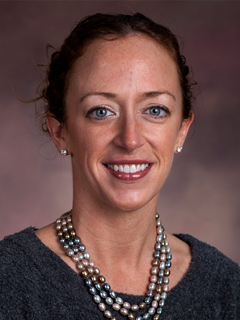
Megan Lewis, MSN, CRNP
Food Allergy Bravery Clinic: Helping Children With Food Allergies Overcome Anxiety
Researchers have shown that a first-of-its-kind program at CHOP can help children with food allergy-related anxiety reduce their fears and improve their quality of life. The program, Food Allergy Bravery (FAB), provides cognitive behavioral therapy in five to eight sessions to children who have severe anxiety related to their food allergies. Annals of Allergy, Asthma & Immunology published the findings.
The study found that, after six FAB program sessions, patients showed significant reductions on two standardized scales of anxiety: one created at CHOP that measures food allergy-specific anxiety (SOFAA) and one that measures general anxiety (SCARED). Improvements were seen on both child-rated and parent-rated forms. Caregivers also filled out satisfaction surveys at the end of treatment, with the results showing 100% of caregivers found the FAB program to be "very helpful" or "extremely helpful" for their children as well as themselves. Children and parents also reported improvement in quality of life.
"For children with food allergies, a little anxiety is helpful in staying vigilant, but too much anxiety can prevent them from participating in safe — and fun — activities that are important for their development and quality of life," said study co-author Megan Lewis, MSN, CRNP, co-director of FAB at CHOP. "This study shows that our Food Allergy Bravery program is a successful treatment for helping children with food allergy anxiety overcome their fears and improve their day-to-day life."
See CHOP News to learn more.
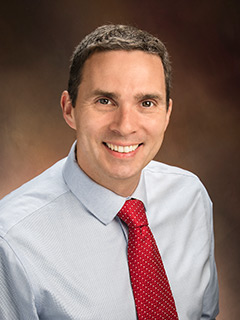
Ingo Helbig, MD
Telemedicine Becomes Standard Component of Child Neurology Care for Many Patients
In the largest study of telemedicine in child neurology to date, researchers from the Epilepsy Neurogenetics Initiative (ENGIN) Frontier Program at CHOP found that across nearly 50,000 visits, patients continued to use telemedicine effectively even with the reopening of outpatient clinics a year after the onset of the COVID-19 pandemic. More work is necessary, though, to reach a wider population with telemedicine, as prominent barriers for socially vulnerable families and racial and ethnic minorities persist. The journal Developmental Medicine & Child Neurology published the findings.
The observational study involved a cohort of 34,837 in-person visits and 14,820 telemedicine outpatient visits between October 2019 and April 2021 across a total of 26,399 child neurology patients.
"Our group has studied telemedicine extensively, and our findings demonstrate how telemedicine has become a standard component of child neurology care for many patients," said senior study author Ingo Helbig, MD, a pediatric neurologist and core faculty member of the ENGIN Frontier Program at CHOP. "Increased use of telemedicine was prompted by a public health emergency; we need to make sure that, as these new tools for patient care remain prevalent, we're continuing to learn about and address disparities in care and optimize access for socially vulnerable families so they have the tools necessary should another similar public health crisis occur."
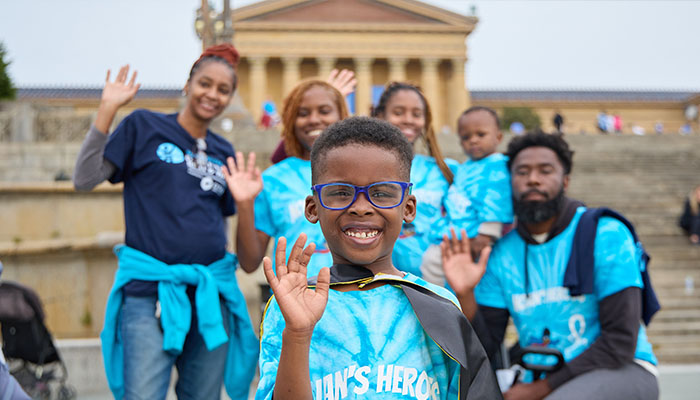
Smiling participants in this year's Parkway Run & Walk.
Parkway Run & Walk Raises More Than $2M for Pediatric Cancer Research
Thousands of runners and walkers laced their sneakers and took to Benjamin Franklin Parkway Saturday, Sept. 24, to participate in the 20th Parkway Run & Walk. In recognition Childhood Cancer Awareness Month, the 5K run/2K walk raises funds for breakthrough pediatric cancer research and care at CHOP's Cancer Center. After two years of virtual events, the 2022 Parkway Run was back in person — and it was a huge success, raising $2,009,581 and counting for children battling cancer.
The funds support the efforts of CHOP physician-scientists who are working to discover new treatment options. They're developing clinical trials that give patients access to the newest therapies under investigation — with the goal of revolutionizing pediatric cancer care.
Learn more and see photos of this year's race.
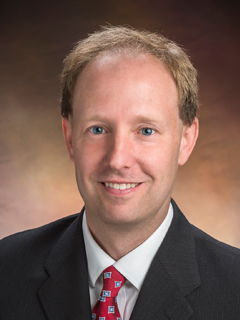
Brian Fisher, DO, MPH, MSCE
CHOP Receives Joint NIH Grant to Study Antifungal Therapy
The National Institutes of Health awarded CHOP and Arkansas Children's Research Institute more than $9 million in funding to conduct a unique study on antifungal therapy in children. Brian Fisher, DO, MPH, MSCE, attending physician and associate chair of Research for the Department of Pediatrics is leading the study along with William Steinbach, MD, pediatrician in chief at Arkansas Children's Hospital.
The seven-year clinical trial will help researchers determine if a shorter course of therapy is effective at treating uncomplicated candidemia, the most common invasive fungal disease in children. The study will leverage the International Pediatric Fungal Network, a 58-site international research consortium focused on defining the best ways to diagnose and treat deadly invasive fungal infections in children. Drs. Fisher and Steinbach co-lead the network.
"In addition to being one of the first clinical trials to compare different durations of therapy for invasive fungal disease, this study will utilize a novel outcome measure referred to as Desirability of Outcome Ranking or 'DOOR,'" Dr. Fisher said. "This outcome approach, developed by Dr. Scott Evans at the George Washington University, captures both the benefits and consequences of an intervention, which makes it an ideal measure for assessing different durations of antifungal therapy."
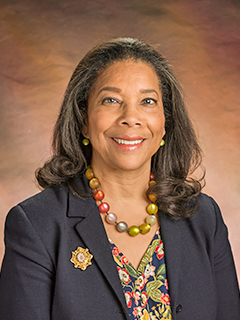
Alexis Thompson, MD, MPH
Dr. Alexis Thompson Discusses Early Successes of Gene Therapy for Sickle Cell Disease
Sickle cell disease is a group of inherited blood disorders characterized by chronic anemia, episodes of pain, and other serious complications, including stroke. Researchers, including those at CHOP, have been investigating the use of gene therapy to treat the condition, giving those living with sickle cell disease much hope. In a short documentary by the New England Journal of Medicine, Alexis Thompson, MD, MPH, chief of the Division of Hematology at CHOP who holds the Elias Schwartz, MD, Endowed Chair in Hematology, discusses the early successes of gene therapy, as well as its risks and benefits.
ICYMI
Catch up on our headlines from our Sept. 16 In the News:
- Multiple Genetic Risk Markers for Pediatric Sleep Apnea Identified
- Researchers Investigate Novel Therapeutic Options for Rare and Aggressive Form of Mitochondrial Disease
- Genomic Landscape of Acute Lymphoblastic Leukemia Mapped by Research Team
- 3D Mapping Techniques Help Researchers Implicate Series of Genes as Drivers of Type 2 Diabetes Risk
Keep up with our news, stories, and updates in real time by following us on Twitter, Facebook, LinkedIn, or Instagram. Meet the minds behind the science in the Bench to Bedside podcast. Or subscribe to our biweekly newsletter, Research Insider, by signing up here.


